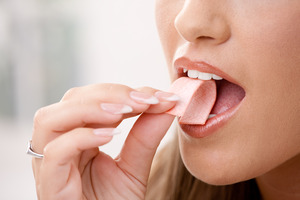
If you chew gum, you’re certainly not alone! It has been estimated that the average American chews around 300 pieces of gum over the course of a single year. And if you’re chewing sugarless gum, you can enjoy several oral health benefits such as increased saliva production. But what if you’re suffering from a TMJ disorder? Is chewing gum still a good idea? Here’s what you need to know to keep your jaw pain under control.
What is a TMJ Disorder?
TMJ is short for “temporomandibular joint”, which is the name of the joints on either side of your head that connect your lower jaw to your skull. Sometimes your TMJ can become misaligned or injured due to physical stress or cartilage degeneration, resulting in what’s known as a TMJ disorder. This condition can cause you to experience chronic jaw pain, difficulty opening or closing your mouth, earaches, headaches, and other symptoms.
Can Chewing Gum Make a TMJ Disorder Worse?
When you chew gum, the muscles around your TMJ have to work harder than normal. If you’re already suffering from a TMJ disorder, then the movement may end up aggravating your condition. You’ll likely start to feel significant pain in your jaw, and you might even develop a severe headache. In short, chewing gum is one of the last things you should be doing if you’re already dealing with jaw problems.
So What Should You Do If You Have a TMJ Disorder?
One of the first things you should do when suffering from chronic jaw pain is call your dentist. They can take X-rays and other scans to determine whether or not you’re truly suffering from a TMJ disorder. Then they can suggest one of several forms of treatment to relieve your pain, such as:
- Occlusal Adjustments: Teeth that don’t come together correctly can prevent your jaw muscles from relaxing. Your dentist can slightly reshape your upper and lower teeth so that they meet each other evenly.
- Occlusal Splints: An occlusal splint is an oral appliance that can protect the teeth from the involuntary grinding and clenching that can contribute to a TMJ disorder.
- BOTOX®: A BOTOX® injection can relieve tension in your jaw and stop the unconscious movements that often make TMJ disorders worse.
- Deprogrammer Diagnostics Technology: A deprogrammer is a special device that you can wear while sleeping for about two weeks. In addition to helping to relieve your immediate pain, it can realign the teeth and show us what the proper position of your bite can look like; this can be crucial for developing a plan to address the true source of your TMJ disorder.
In short, if you think you have a TMJ disorder, you need to take steps to avoid gum chewing and any other habits that could lead to further pain; you should also reach out to your dentist to schedule an appointment as soon as possible. Acting quickly is the key to finding relief from your jaw pain.
About the Author
Dr. Tristan J. Parry earned his Doctor of Dental Surgery at Ohio State University. He is a Fellow of the Academy of General Dentistry, which is something that less than 7% of general dentists in the United States have accomplished. At Magnolia Shores Family Dental in Summerfield, he offers occlusal splints, BOTOX®, and other solutions for TMJ disorder. To schedule a consultation with Dr. Parry, visit his website or call (336) 728-6153.

